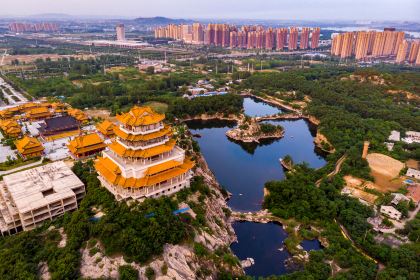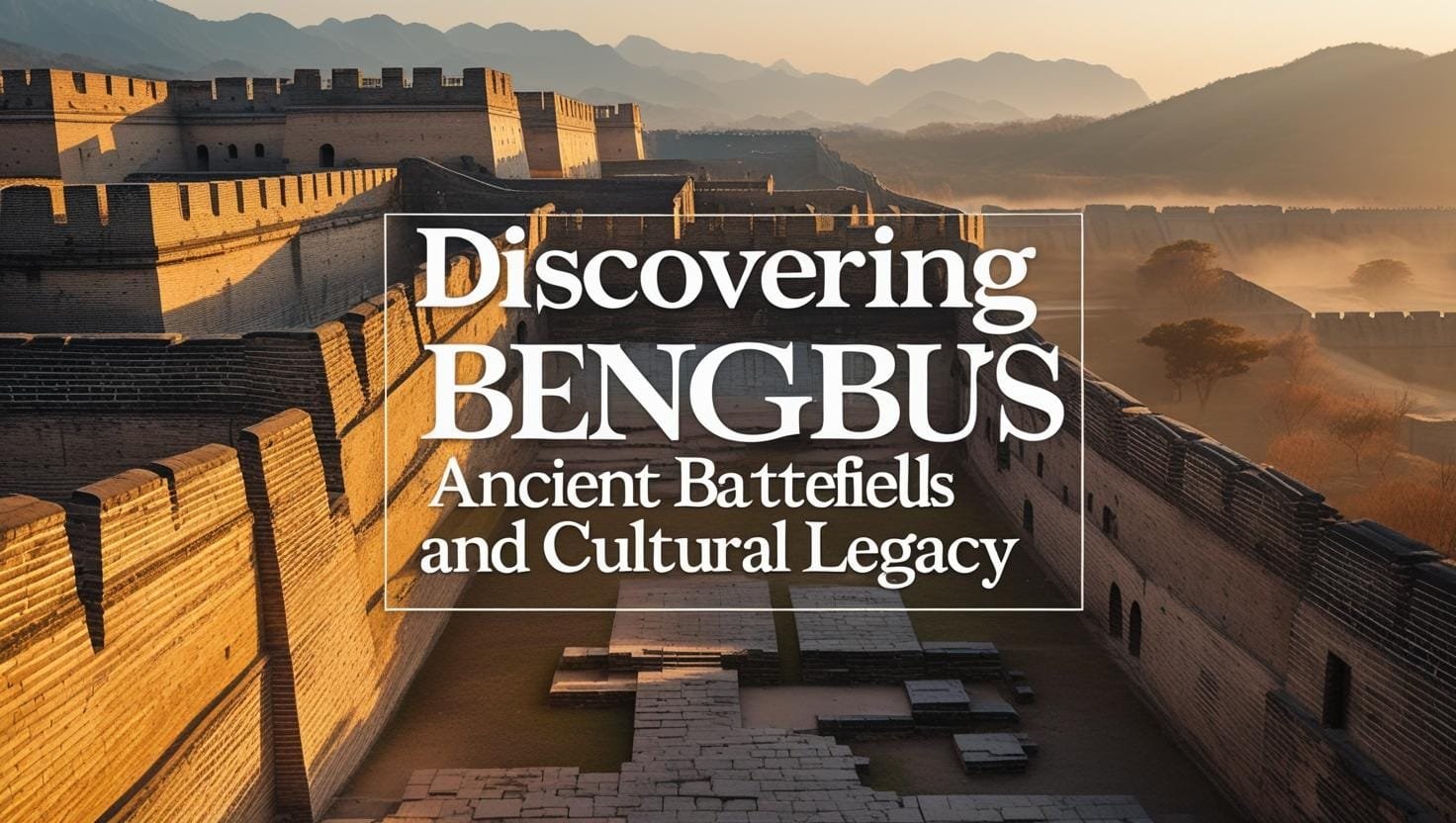Discovering Bengbu’s Ancient Battlefields and Cultural Legacy

Welcome to another exciting adventure on jusha.travel, your go-to source for uncovering the hidden gems of China! If you’re a history buff, culture enthusiast, or simply curious about Bengbu ancient battlefields, this guide is for you. Nestled along the Huai River in Anhui Province, Bengbu is a treasure trove of Bengbu cultural heritage, blending ancient warfare sites with rich traditions that echo through China’s military history. In this post, we’ll explore how these elements make Bengbu a must-visit for China cultural tours, offering practical tips and insights to enhance your journey. Whether you’re planning a deep dive into China military history or seeking cultural attractions in Bengbu, let’s embark on this discovery together—because at jusha.travel, we love sharing tips to make your China journey unforgettable!
Bengbu’s Historical Roots: A Gateway to Ancient China

Bengbu, often called the “Clam Wharf,” has a story that stretches back over 30,000 years, making it a fascinating stop on any Bengbu travel guide. This city’s roots are deeply intertwined with the Huai River, which has served as a lifeline for trade, culture, and even conflict throughout history. Archaeological sites like the Xi You Site reveal early human activity, with relics such as carved bones and pottery shards showcasing the ingenuity of ancient inhabitants. These discoveries not only highlight Bengbu’s cultural heritage but also provide a window into the daily life of prehistoric communities along the riverbanks.
For travelers interested in China cultural tours, Bengbu offers a unique blend of natural beauty and historical significance. Imagine strolling along the Huai River, where the Dongyi peoples—known as the Huaiyi—once thrived, developing customs that influenced both northern and southern Chinese traditions. This fusion is evident in local festivals and cuisine, such as freshwater pearls inspiring dishes. A practical tip: Visit during the autumn months for milder weather, and don’t miss the Bengbu Museum (for more details, check out this resource: Pregnant sand into pearl—history and culture exhibition of Bengbu). It’s a great spot to see artifacts up close, and packing comfortable walking shoes will make your exploration more enjoyable.
What makes Bengbu truly special is its role as a crossroads of cultures. As you delve into these ancient layers, you’ll gain insights into how geography shaped China military history. For instance, the river’s strategic importance meant it was both a trade route and a defensive line, influencing battles that defined empires. If you’re traveling with family, consider joining a guided tour—these often include interactive elements that bring history to life, making it an engaging experience for all ages.
Exploring the Gaixia Battlefield: Epic Tales of Valor

No discussion of Bengbu ancient battlefields would be complete without diving into the legendary Gaixia Battlefield, located just about 40 kilometers north of Bengbu in Haocheng Town. This site is a cornerstone of China military history, where the Battle of Gaixia in 202 BC marked a pivotal turning point in the Chu-Han Contention. Here, Liu Bang’s Han forces outmaneuvered Xiang Yu’s Chu army, leading to the establishment of the Han Dynasty. It’s stories like these that make cultural attractions in Bengbu so captivating, blending drama, strategy, and human emotion.
As you stand on the restored battlefield grounds, you can almost hear the echoes of ancient warriors. Xiang Yu, known as the “Hegemon-King of Western Chu,” met his tragic end here, a tale immortalized in Chinese literature and theater. For modern visitors, this isn’t just a historical site—it’s an opportunity to reflect on themes of resilience and leadership that resonate today. A fun fact: The battle’s strategies influenced later military tactics, showing how Bengbu’s cultural heritage continues to inspire.
Practical advice for your visit includes arriving early to avoid crowds and bringing a hat for sun protection, as the open fields can get quite warm. Combine your trip with a stop at local teahouses, where you can sip oolong tea while discussing these events with fellow travelers. If you’re into technology, download apps like those from the China National Tourism Administration for augmented reality experiences that overlay historical reenactments onto your phone screen. For more on this iconic battlefield, explore this detailed account: Ancient Gaixia Battlefield – China Daily. It’s a reminder of how Bengbu travel guide essentials include blending history with modern tools for an immersive experience.
Bengbu’s Archaeological Marvels and Cultural Treasures

Beyond the battlefields, Bengbu’s cultural attractions shine through its archaeological sites, offering a deeper look at 30,000 years of human innovation. Excavations at places like the Xi You Site have unearthed tools and artifacts that illustrate the evolution of society in the Huai River basin, connecting directly to broader themes in China cultural tours. These finds, including Neolithic pottery, reveal how early residents adapted to their environment, developing agriculture and craftsmanship that laid the groundwork for Chinese civilization.
One highlight is the way Bengbu’s heritage intersects with everyday life. For example, the city’s pearl fishery tradition has evolved into modern cultural practices, like pearl-themed art festivals that celebrate local ingenuity. If you’re a foodie, try pairing your visit with regional specialties such as Huaiyang cuisine, known for its delicate flavors and fresh ingredients—think steamed fish with river pearls as a garnish for a poetic touch. This not only ties into Bengbu cultural heritage but also showcases China’s diverse culinary landscape.
For those intrigued by China military history, Bengbu’s proximity to sites like Taierzhuang adds another layer. Though not in Bengbu proper, the 1938 Battle of Taierzhuang during the Second Sino-Japanese War exemplified fierce resistance. Learn more about this resilient chapter: Battle of Taierzhuang – Wikipedia. A tip for cultural enthusiasts: Engage with local communities through homestays, where hosts often share stories and recipes.
Modern Bengbu: Preserving Legacy for Today’s Travelers
In today’s Bengbu, the past meets the present in vibrant ways, making it an ideal destination for anyone following a Bengbu travel guide. Sites like the Gaixia Battlefield have been preserved as memorials, complete with museums that use interactive displays and technology to educate visitors about Bengbu ancient battlefields. This blend of old and new highlights how Bengbu’s cultural heritage is kept alive through education and tourism.
From universities hosting cultural festivals to restored historical areas, Bengbu invites you to experience its stories firsthand. A practical insight: Use ride-sharing apps for easy navigation, and consider timing your trip with events like the annual Huai River Festival. This fuses China military history with contemporary life, showing how ancient legacies influence modern identity.
As you wrap up your visit, reflect on how Bengbu’s stories of perseverance can inspire your own travels. It’s this connection that makes China cultural tours so rewarding.
In conclusion, discovering Bengbu’s ancient battlefields and cultural legacy offers an unforgettable glimpse into China military history and beyond. From the strategic brilliance of Gaixia to the archaeological wonders along the Huai River, this city encapsulates the spirit of resilience that defines Chinese culture. We’ve only scratched the surface of what makes Bengbu ancient battlefields and cultural attractions in Bengbu so special, but we hope this guide inspires you to explore more. Here at jusha.travel, we’re passionate about helping you uncover China’s hidden stories. What are your thoughts on Bengbu? Share your experiences in the comments below, visit jusha.travel for more inspiring articles, or check out our related guides to plan your next adventure. Let’s keep the conversation going and make every trip memorable!

